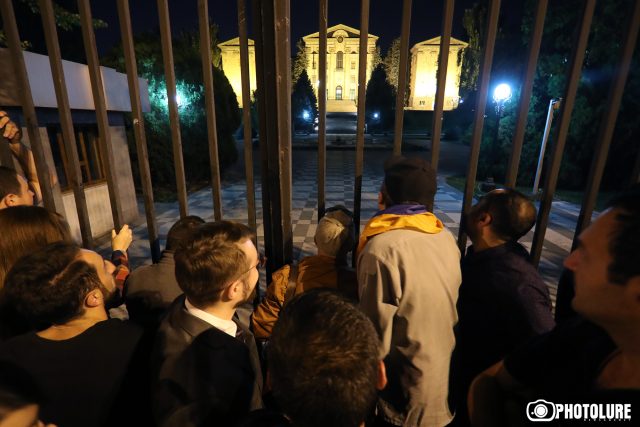There has not yet been any revolution in history where the initiators, taking the “former authorities” out of power, announced, “Well, we’re going home now. Whoever wants to lead the country can do so.” The person who gets rid of the former authorities now takes over the country. It’s also difficult to imagine a revolution, where the former authorities say, “Ok, we lost, let’s go home.” The former authorities resist, and, depending on the amount of levers they have and their influence, their resistance is either strong or somewhat weak.
The revolutionaries, naturally, try to break that resistance with any method they can. Our former authorities’ resource is money, and at the moment, the National Assembly, which the fight is for right now. Our revolutionaries’ resource is their strong structure, where sometimes they take the more influential representatives of the former authorities (whom they then, whenever possible, put in jail), and, of course, the majority of citizens, who now are easy to mobilize from the prime minister’s first call. There is nothing extraordinary or emotional about this. It’s a normal fight for power. Is power something sweet or corrupted, and is it for corrupt individuals? People who like to control, guard, and with a simple pointing of the figure, show 10, 100, or 10,000 people the right direction are the ones who become politicians.
The former authorities will soon be deprived of the National Assembly which will dissolve, as well as some part of their money because of the operations of several structures. In one or two years, we won’t remember their existence at all. But the revolutionaries’ resource, the people, isn’t unlimited either. Calling upon supporters in every situation is impossible. If people don’t start to live better lives, then after the 10th or 20th “call to mobilize” they will ask, “where am I going, and what am I chanting?” That is why, when solving political issues, only putting hopes on gatherings and chants isn’t realistic. State mechanisms and the law also need to be used.
The last chapter of the former authorities’ resistance; if the speculations are correct, that the “riotous” parliament members are controlled by Robert Kocharyan, then I, for example, will hesitate to believe their verbal assurances and gentlemanly agreements. There are lots of good and bad things that can be said about the second president, but one thing is clear: he is not a gentleman.
Aram Abrahamyan

















































